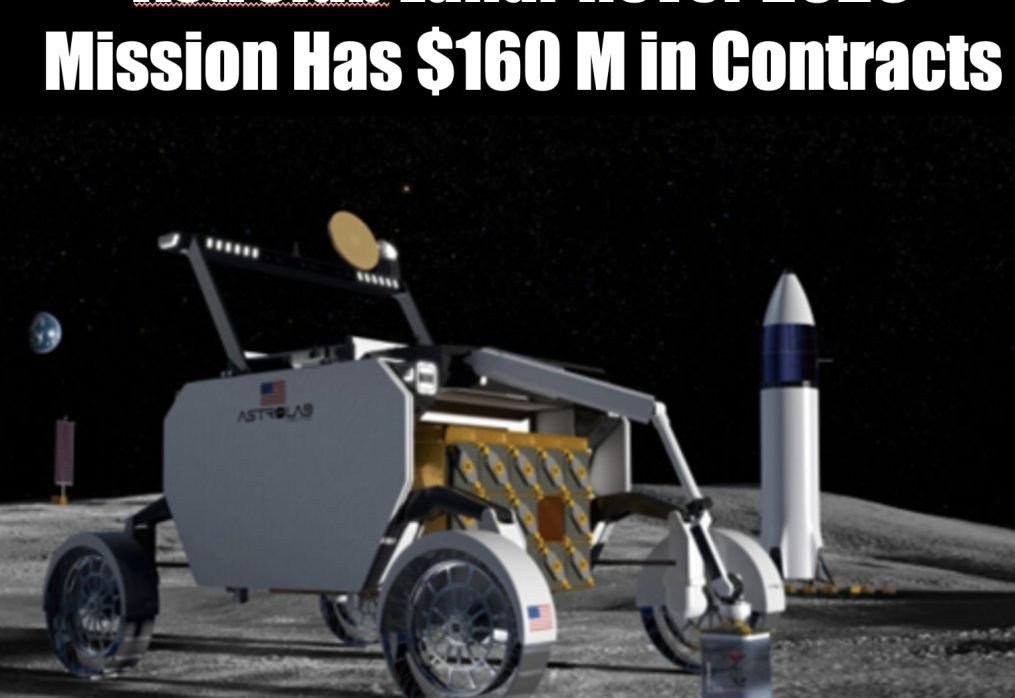Astrolab Moon Rover Has $160 Million in Contracts
Five customers are releasing details of their payloads: Argo Space, Astroport, Avalon Space, Interstellar Lab, and LifeShip. Three more customers are contracted with Astrolab but intend to release details of their payloads at a future date, closer to launch. Collectively, these eight contracts are valued at more than $160 million.
As part of Mission 1, Space Exploration Technologies (SpaceX) will transport Astrolab’s Flexible Logistics and Exploration (FLEX) rover to the lunar surface. SpaceX will use the Starship launch and landing system for this mission as soon as mid-2026. Following landing on the Moon, FLEX will deploy payloads for each of the customers. SpaceX and Astrolab expect Mission 1 to be completed as soon as mid-2026.
“Our entire Astrolab team is excited to welcome these businesses to Mission 1,” said Jaret Matthews, CEO and Founder, Astrolab. “Together, they represent a cross-section of the emerging lunar economy. As we get closer to our launch date, we expect to make additional customer announcements.”
Matthews added that given FLEX’s total payload capacity of 1,500 KG, Astrolab is able to substantially lower the cost of deploying payloads on the lunar surface while providing unparalleled maneuverability, range, power, and communications capabilities. The company estimates its prices are approximately ten times more affordable than those of competitors.
The Astrolab customers announced today include:
Argo Space Corp. (Argo) of Hermosa Beach, California intends to use FLEX to deploy a demonstration payload that will advance the development of Argo’s unique, scalable technology designed to harvest low-concentration water from Lunar regolith. Argo’s novel processing approach will economically extract water outside of permanently shadowed regions (PSRs). This mission is a major step in the company’s efforts to use water from regolith for commercial applications to make in-space transportation abundant and build a Lunar economy. “We’re excited to work with Astrolab on this and future missions to catalyze a commercial Lunar economy and a sustained presence on the Moon,” said Robert Carlisle, CEO, Argo Space.
Astroport Space Technologies of San Antonio, Texas builds infrastructure for the Moon, and intends to melt regolith to make bricks for roads, launch and landing pads, and shelters. To understand the properties of the regolith in the lunar environment, the payload will demonstrate a proof of concept for a proprietary sieving and grain separation technology that mitigates electrostatic forces inherent in the regolith. This technology will isolate the regolith grains that are ideal for manufacturing lunar bricks. FLEX’s robotic arm will collect regolith for the sieving and grain separation experiment.
Separately, the Astroport payload also includes a limited number of personalized lunar simulant basalt bricks sold exclusively for placement on the lunar surface to mark the start of the first road on the Moon. “Our ideal customer for our personalized brick program is someone from an Artemis Accords signatory country who places an order for a brick to be made from the basalt soil of their respective country,” said Sam Ximenes, CEO, Astroport. FLEX will use its robotic arm to install these bricks to begin the construction of this initial lunar road.
Avalon Space of Toronto will use FLEX to conduct a series of science, exploration and sustainable development experiments focused on the emerging lunar economy, leveraging a suite of both onboard and deployed elements on the lunar surface.
“I don’t think anyone doubts that there will likely be a pre-Starship and post-Starship point in human history,” said Dr. Nadeem Ghafoor, CEO of Avalon Space. “We’re thrilled to be working with Astrolab and our international and commercial partners on this first mission to help unlock the potential of this new era of beyond-Earth orbit development. The next decade is going to change everything, and we’re looking forward to doing our part to help it be as peaceful, collaborative, impactful and economically significant as possible.”
Interstellar Lab of Ivry-sur-Seine, France and Kennedy Space Center, Florida plans to use FLEX to deploy the two small plant pods on the lunar surface. Once deployed, Interstellar Lab will measure the impact of the lunar environment on the plant’s phenotype and molecular composition.

Brian Wang is a Futurist Thought Leader and a popular Science blogger with 1 million readers per month. His blog Nextbigfuture.com is ranked #1 Science News Blog. It covers many disruptive technology and trends including Space, Robotics, Artificial Intelligence, Medicine, Anti-aging Biotechnology, and Nanotechnology.
Known for identifying cutting edge technologies, he is currently a Co-Founder of a startup and fundraiser for high potential early-stage companies. He is the Head of Research for Allocations for deep technology investments and an Angel Investor at Space Angels.
A frequent speaker at corporations, he has been a TEDx speaker, a Singularity University speaker and guest at numerous interviews for radio and podcasts. He is open to public speaking and advising engagements.

